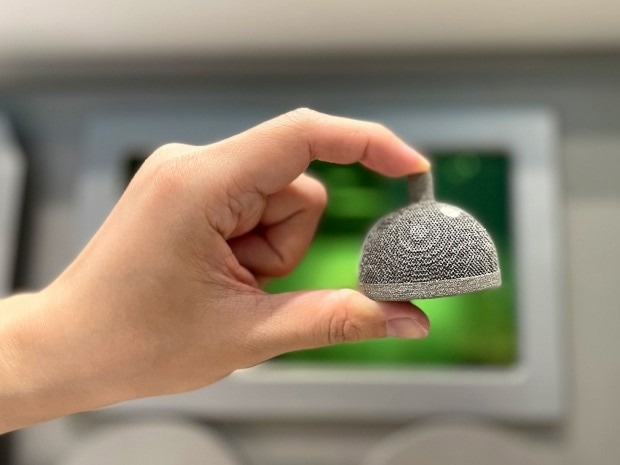Patients at Singapore General Hospital (SGH) are anticipated to gain from medical innovations, including personalized implants and devices, as a result of a joint research and development laboratory in additive manufacturing (AM), also referred to as 3D printing, being established in conjunction with Nanyang Technological University, Singapore (NTU Singapore).
 NTU’s Singapore Centre for 3D Printing (SC3DP) is able to print orthopedic implants made from titanium-tantalum that can be customized to a patient’s unique anatomy, reducing the amount of surgical time in hospital. Image Credit: NTU Singapore.
NTU’s Singapore Centre for 3D Printing (SC3DP) is able to print orthopedic implants made from titanium-tantalum that can be customized to a patient’s unique anatomy, reducing the amount of surgical time in hospital. Image Credit: NTU Singapore.
Though still in the early stages of development, these developments would mark a substantial step forward in the direction of innovative healthcare solutions that have the potential to completely change the way patients are treated.
The partnership makes use of the facilities and combined expertise of the Singapore Centre for 3D Printing (SC3DP) at NTU and the 3D Printing Centre at SGH to research and develop relevant technologies for clinical applications at a point-of-care setting.
For more than 200 years, SGH has been a beacon of hope for all patients, consistently staying at the forefront of medicine. As a leading Academic Medical Centre with the privilege of being ranked among the world's best, our razor-sharp focus is on providing the best care and experience for our patients. This is a responsibility we take seriously, particularly as many who entrust us with their care have extremely complex health conditions.
Kenneth Kwek, Professor and Chief Executive Officer, Singapore General Hospital
He added, “We deeply value collaboration with like-minded partners and we are so grateful to find a key partner who shares our values and who brings with them deep expertise. Together, the possibilities that we can bring to our patients are limitless. We can advance care to enable better outcomes and a better experience for all patients and future users of healthcare.”
Professor Lam Khin Yong, Vice President (Industry) of NTU Singapore added, “Through the combined medical expertise from SGH and the extensive knowledge of additive manufacturing and advanced materials of NTU’s faculty, our collaboration aims to forge innovative solutions in the development of personalized prosthetic and orthotic devices and explore new pathways for regenerative medicine. This collaboration also greatly benefits the next generation of clinicians, academics, and engineers, through its upcoming shared educational programs, shared resources, and joint initiatives. NTU and SGH are committed to nurturing new talent that possesses the skills and knowledge needed to navigate the ever-evolving medical landscape.”
Healthy aging and living are two of the four major challenges facing humanity that NTU seeks to address through its NTU 2025 strategic plan. The partnership, which aims to provide solutions that could redefine patient treatment, reflects NTU’s commitment to addressing these needs and challenges.
The following four topics will be the focus of the Joint R&D Lab in additive manufacturing:
1. Prosthetic & Orthotic Devices
This study focuses on creating modeling and additive manufacturing approaches for Prosthetic & Orthotic (P&O) devices such as Ankle Foot Orthosis, Wrist Hand Orthosis, and Below Knee Amputation Sockets.
Creating design specifications and standards for the devices' 3D printing, which will entail material selection, technical analysis, and functional testing, is one of the main goals. Furthermore, the project will research and identify the best materials and production processes using several additive manufacturing technologies.
2. Bioprinting for Regenerative Medicine
The goal of this research focus is to advance the field of bioprinting—the 3D printing of living tissues—especially for applications in regenerative medicine. This entails investigating the therapeutic uses of bioprinting and attempting to convert the field's current research into useful therapeutic applications. Evaluating the viability and infrastructure needed to set up bioprinting capabilities at the point-of-care will be a component of this endeavor.
To further maximize bioprinting’s potential influence in regenerative medicine, the project will also concentrate on performing research into novel bioprinting applications that have great clinical value, such as printing human organs.
3. 3D Printed Implants at Point-of-Care
The third area of research looks at developing capabilities for direct 3D printing of medical implants at the point-of-care. This will entail investigating the possibilities of technologies such as metal 3D printing and PEEK, a type of plastic known as polyetheretherketone, to produce implants for particular medical procedures like surgically repairing a bone defect in the skull and reconstructing the surrounding bones of the eyeball.
To guarantee efficient and successful deployment, a full analysis of the infrastructure needs and viability of setting up implant printing capabilities will also be conducted.
4. Additive Manufacturing Technology Landscaping for Healthcare Applications
Examining and improving the state of additive manufacturing technology specifically for the healthcare industry entails locating and creating potentially significant clinical applications, such as food printing and flexible electronics for medical monitoring equipment.
With the goal of integrating cutting-edge 3D printing technology into a range of medical demands, the focus is on developing the skills and strategies to transfer these creative applications into real-world healthcare use cases.